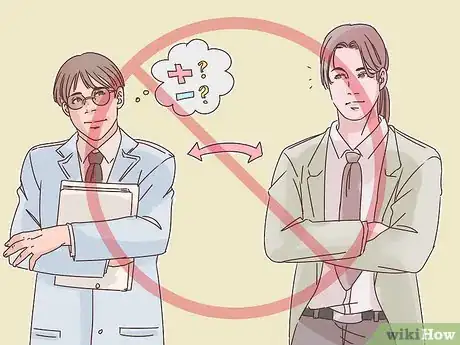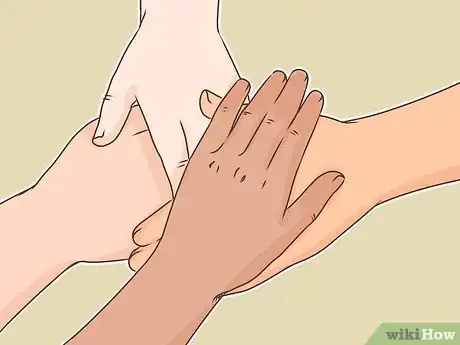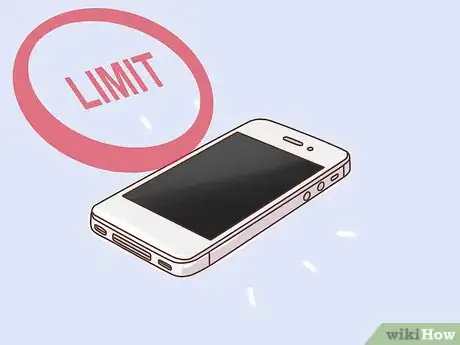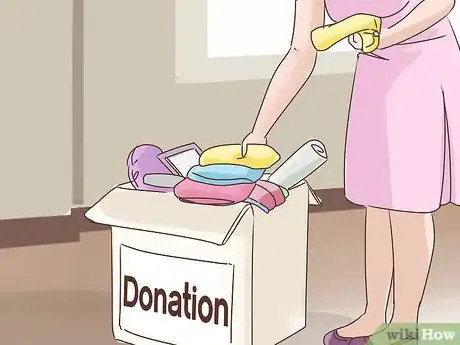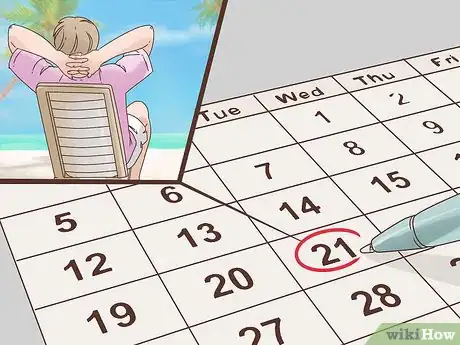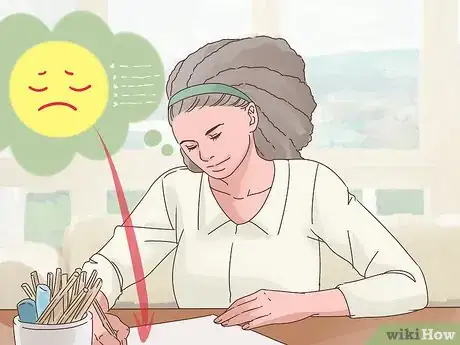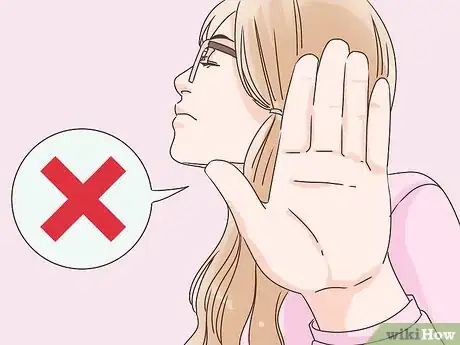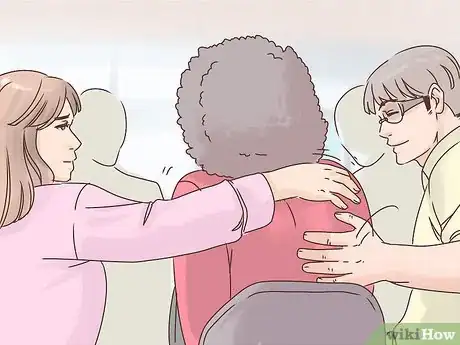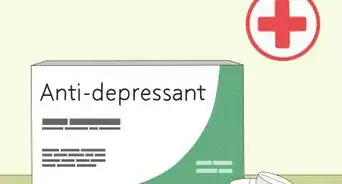This article was co-authored by Jennifer Butler, MSW. Jennifer Butler is a Love & Transformation Coach and the Owner of JennJoyCoaching, a life coaching business based in Miami, Florida, although Jennifer works with clients all over the world. Jennifer’s work centers around empowering women who are navigating any stage of the divorce or breakup process. She has over four years of life coaching experience. She is also the co-host of the Deep Chats Podcast along with Leah Morris and the host of season 2 “Divorce and Other Things You Can Handle” by Worthy. Her work has been featured in ESME, DivorceForce, and Divorced Girl Smiling. She received her Masters of Social Work (MSW) from New York University. She is also a Certified Health Coach, a Communications & Life Mastery Specialist, and a Certified Conscious Uncoupling and Calling in “the One” coach.
There are 7 references cited in this article, which can be found at the bottom of the page.
wikiHow marks an article as reader-approved once it receives enough positive feedback. In this case, 100% of readers who voted found the article helpful, earning it our reader-approved status.
This article has been viewed 75,069 times.
Burnout overall physical and emotional exhaustion resulting from being over worked. Burnout is prevalent if you are often multi-tasking and being asked to do too much. Signs of burnout include feeling hopeless, chronic fatigue, decrease in self-care (like basic hygiene or eating), having poor boundaries, becoming cynical, and isolating yourself. If you are feeling burnt out, work on making changes to your lifestyle. Try to find meaning in your life and relationships. Alter your routine to allow more downtime. If you find you need to make changes, such as switching careers, do so to lessen burnout.
Steps
Changing Your Mentality
-
1Look for meaning in your work. If you are experiencing burnout, you may begin to lose sight of why your work matters to you. Even if you were once passionate about your job, constantly overextending yourself can deplete this passion. Allow yourself some time to think about what is meaningful about your work. This may give you a temporary boost to get through the next few days.[1]
- If you don't find your current work or project meaningful, think about how it relates to a larger goal that is important to you. For instance, maybe you don't feel passionate about working in the mail room at a big company, but you know that it is the first step toward moving up to get the job you really want.
- Try talking to a higher up at work to see if you can take on any projects that are meaningful to you. You may feel less burnt out if your passions and skills can better match your commitments.[2]
- You can also try to shift your focus to any aspects of your work, even small things, that you do enjoy. Even mundane jobs carry meaning. If you're just doing data entry for an organization, for example, think about the larger goals of that organization and how you contribute to the cause.[3]
-
2Find a better work/life balance. If you feel your life is nothing but work, try to find fulfillment elsewhere. No one can work all day every day and not feel burnt out. If you don't find meaning from your job, look at the roles you fulfill outside of the office.[4]
- Where else can you find meaning and satisfaction if you're frustrated with your work? Think about your relationships with friends and family members. Think about any hobbies you have you find personally enjoying and fulfilling.
- It's important to have some balance in life. Everyone needs multiple outlets to feel fulfilled and happy, so be open to reminding yourself of everything you take pride in, not just your professional life.
Advertisement -
3Stop comparing yourself to others. Many times, burnout is the result of being too hard on yourself. This often manifests in comparing yourself to others on a similar life path or in a similar field. Try to avoid comparing yourself to others.[5]
- Comparisons can sometimes be helpful if you are comparing who you are today with an older version of yourself to see how far you've come. Then you can ask yourself what changes you'd like to make and how you'd like to keep growing in the future.
-
4Join a support group. If you're feeling very burnt out and struggling to stay confident, seek outside support. Many support groups focus on stress reduction techniques. You also do not have to join an official support group. You can find a group of friends and agree to get together and vent once a month.[6]
- If you want a support group for issues like stress and anxiety, which can cause burnout, check at a local counseling center and hospital. If there are no support groups in your area, you can seek support online through forums.
Changing Your Routine
-
1Take more breaks. No one can go all day every day without feeling burnt out. If you are experiencing severe burnout, force yourself to take more breaks throughout the day.[7] This will result in you being more energetic and productive.[8]
- If you're the type to overwork, it can be hard to force yourself to take breaks. However, work on reminding yourself breaks are necessary to your emotional well being and will actually result in increased productivity.
- Set a few alarms on your phone to remind yourself to take breaks.[9]
- When you start feeling frustrated or burnt out, force yourself to step away. Go for a walk, have a snack, listen to some music, or do anything else you need to recharge. Then, return to work with a refreshed mental state.
-
2Limit time on electronic devices. Electronic devices can be great for unwinding or socializing, but can sometimes contribute to burnout if you feel like you're never really away from your work. If you have work-related emails coming in on your smartphone, it will be difficult to disengage and relax. Try stepping away from your phone for an hour or so every night to focus on relaxing and unwinding.[10]
- If you use your phone for relaxing activities, like listening to music, try disabling notifications for the night or logging off your email.
-
3Get involved in your community. If you're feeling a lack of energy and excitement, you may need to add something new to your routine to make you feel more fulfilled. Connecting with something that's personally meaningful for you can help. Look into your local community and see where and how you can get involved.[11]
- Think about what you find personally meaningful. You could volunteer for a charity, a church, a non-profit, or any other organization that feels meaningful to you.
-
4Take more vacations. If you have sick days or vacation days, use them. Taking a break from work when possible can help lessen burnout. Everyone needs a break now and again, so make a point of taking a vacation every few months.[12]
- If you're on a budget, keep in mind a vacation doesn't have to be costly. You can do a stay-cation, where you just stay at home and enjoy your local community. You can also do something like a day trip to a nearby city.
- If your company offers personal days, use those to have a free day at home or take care of personal needs or tasks that you haven't been able to address.
-
5Schedule time to relax. Time to relax is as important to your well-being as making time for productivity.[13] Adjust your schedule to give yourself time to take breaks and unwind. Look for pockets of time where you don't have anything to do.
- Use that time to relax without feeling guilty.[14] Remind yourself you don't need to fill every minute with work. It's okay to give yourself an hour a day to, say, read a book or watch television.
Making Necessary Changes
-
1Take inventory of your stressors. If you're feeling burnt out, it can be helpful to identify why. What are the biggest stressors in your life that are leading to this emotional state? Identify the major causes of your stress can help you see what areas of your life you need to change.[15]
- Write down everything that causes you stress on a day-to-day basis. Is work, family, friends, a social life?
- Think about which areas cause you the greatest stress and why. Maybe you're incredibly stressed out at work because your job is very demanding but low paying.
-
2Review your interests, skills, and talents. Think about what you can do. Review all the assets and talents you could bring into an organization. If work is a major stressor in your life, it may be time to switch gears career-wise. Think about what skills you currently have and how they could be applicable to a more fulfilling career.[16]
-
3Learn to say "No." Burnout is often caused by excessive commitment. If you have too much on your plate, avoid new responsibilities.[17]
- You do not have to feel guilty for saying "No." Sometimes, it's important to your emotional health to disengage and relax. Just because you can do something does not mean you're obligated to do it.
- The next time an opportunity presents itself, review whether you truly have time. Maybe you would like to help run the bake sale with the PTA, but if you're already committed work, raising your children, and other obligations, now is not the time to volunteer.
-
4Reach out to others. Oftentimes, burn out is the result of not granting yourself enough of a personal life. If you're feeling burnt out, try to invest in your relationships. Having a solid support group can help combat burn out.[18]
- Spend time working on your current close relationships. Spend more time with family members and close friends to combat burnout.
- You can also try to make new friends. Reach out to people at work or places where you volunteer.
Expert Q&A
-
QuestionIs it okay to take time to recover from burnout?
 Jennifer Butler, MSWJennifer Butler is a Love & Transformation Coach and the Owner of JennJoyCoaching, a life coaching business based in Miami, Florida, although Jennifer works with clients all over the world. Jennifer’s work centers around empowering women who are navigating any stage of the divorce or breakup process. She has over four years of life coaching experience. She is also the co-host of the Deep Chats Podcast along with Leah Morris and the host of season 2 “Divorce and Other Things You Can Handle” by Worthy. Her work has been featured in ESME, DivorceForce, and Divorced Girl Smiling. She received her Masters of Social Work (MSW) from New York University. She is also a Certified Health Coach, a Communications & Life Mastery Specialist, and a Certified Conscious Uncoupling and Calling in “the One” coach.
Jennifer Butler, MSWJennifer Butler is a Love & Transformation Coach and the Owner of JennJoyCoaching, a life coaching business based in Miami, Florida, although Jennifer works with clients all over the world. Jennifer’s work centers around empowering women who are navigating any stage of the divorce or breakup process. She has over four years of life coaching experience. She is also the co-host of the Deep Chats Podcast along with Leah Morris and the host of season 2 “Divorce and Other Things You Can Handle” by Worthy. Her work has been featured in ESME, DivorceForce, and Divorced Girl Smiling. She received her Masters of Social Work (MSW) from New York University. She is also a Certified Health Coach, a Communications & Life Mastery Specialist, and a Certified Conscious Uncoupling and Calling in “the One” coach.
Love & Empowerment Coach Remember that taking care of yourself isn't selfish. It's necessary to keep yourself well.
Remember that taking care of yourself isn't selfish. It's necessary to keep yourself well. -
QuestionHow do I stop being burnt out?
 Jennifer Butler, MSWJennifer Butler is a Love & Transformation Coach and the Owner of JennJoyCoaching, a life coaching business based in Miami, Florida, although Jennifer works with clients all over the world. Jennifer’s work centers around empowering women who are navigating any stage of the divorce or breakup process. She has over four years of life coaching experience. She is also the co-host of the Deep Chats Podcast along with Leah Morris and the host of season 2 “Divorce and Other Things You Can Handle” by Worthy. Her work has been featured in ESME, DivorceForce, and Divorced Girl Smiling. She received her Masters of Social Work (MSW) from New York University. She is also a Certified Health Coach, a Communications & Life Mastery Specialist, and a Certified Conscious Uncoupling and Calling in “the One” coach.
Jennifer Butler, MSWJennifer Butler is a Love & Transformation Coach and the Owner of JennJoyCoaching, a life coaching business based in Miami, Florida, although Jennifer works with clients all over the world. Jennifer’s work centers around empowering women who are navigating any stage of the divorce or breakup process. She has over four years of life coaching experience. She is also the co-host of the Deep Chats Podcast along with Leah Morris and the host of season 2 “Divorce and Other Things You Can Handle” by Worthy. Her work has been featured in ESME, DivorceForce, and Divorced Girl Smiling. She received her Masters of Social Work (MSW) from New York University. She is also a Certified Health Coach, a Communications & Life Mastery Specialist, and a Certified Conscious Uncoupling and Calling in “the One” coach.
Love & Empowerment Coach I recommend carving more time out of your day for breaks and self-reflection. For example, try giving yourself 30 minutes in the morning and evening to just focus on nourishing yourself. You could read, journal, dance, or listen to music. Whatever you need to recharge and keep yourself going.
I recommend carving more time out of your day for breaks and self-reflection. For example, try giving yourself 30 minutes in the morning and evening to just focus on nourishing yourself. You could read, journal, dance, or listen to music. Whatever you need to recharge and keep yourself going.
Warnings
- If you're experiencing extreme stress or sadness due to burnout, seek out the help of a therapist.⧼thumbs_response⧽
References
- ↑ https://hbr.org/2015/04/how-to-overcome-burnout-and-stay-motivated
- ↑ http://www.forbes.com/sites/vickyvalet/2015/06/23/overcoming-burnout-five-ways-to-get-back-on-track-at-work/2/#180531e263c8
- ↑ https://www.helpguide.org/articles/stress/preventing-burnout.htm
- ↑ https://www.helpguide.org/articles/stress/preventing-burnout.htm
- ↑ http://greatergood.berkeley.edu/article/item/four_risk_factors_for_burnoutand_how_to_overcome_them
- ↑ https://www.psychologytoday.com/blog/high-octane-women/201104/overcoming-burnout
- ↑ Jennifer Butler, MSW. Love & Empowerment Coach. Expert Interview. 2 September 2020.
- ↑ https://hbr.org/2015/04/how-to-overcome-burnout-and-stay-motivated
- ↑ Jennifer Butler, MSW. Love & Empowerment Coach. Expert Interview. 2 September 2020.
- ↑ https://hbr.org/2015/04/how-to-overcome-burnout-and-stay-motivated
- ↑ https://www.helpguide.org/articles/stress/preventing-burnout.htm
- ↑ https://www.helpguide.org/articles/stress/preventing-burnout.htm
- ↑ http://greatergood.berkeley.edu/article/item/four_risk_factors_for_burnoutand_how_to_overcome_them
- ↑ Jennifer Butler, MSW. Love & Empowerment Coach. Expert Interview. 2 September 2020.
- ↑ https://www.psychologytoday.com/blog/high-octane-women/201104/overcoming-burnout
- ↑ http://www.mayoclinic.org/healthy-lifestyle/adult-health/in-depth/burnout/art-20046642?pg=2
- ↑ https://www.psychologytoday.com/blog/high-octane-women/201104/overcoming-burnout
- ↑ https://www.helpguide.org/articles/stress/preventing-burnout.htm


